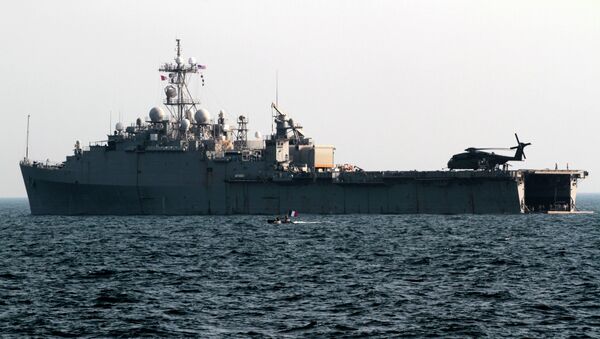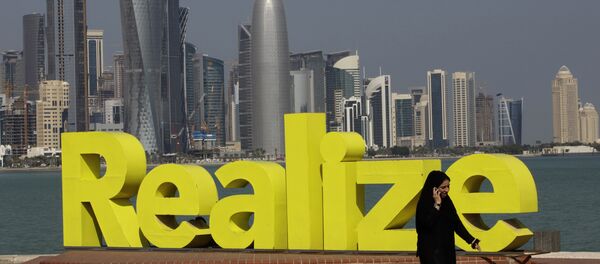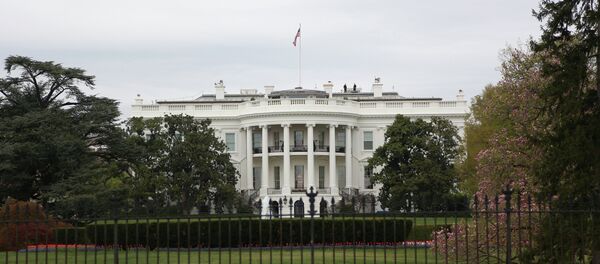Sputnik has discussed the deal to expand US military base in Qatar with James Dorsey, a senior fellow at the Rajaratnam School of International Studies in Singapore, a veteran and an award-winning foreign correspondent.
Sputnik: Pompeo is now in Saudi Arabia just as Washington and Doha struck a deal to expand the US military base in Qatar. How will this development be received by Riyadh?
And in effect, if you read between the lines, the American position on the Gulf crisis, namely that it should be ended as soon as possible and that the feuding parties should sit down for negotiations, is essentially a getaway position.
Sputnik: Doha is said to cover capital expenses for the expansion of the US military base; why is Qatar being so generous?
James Dorsey: First of all, Qatar has an interest in having the base here. Qatar's security and defence policy really amounts not so much to being able to field a battle-hardened strong military but to have multiple relationships internationally that will ensure that other countries have a vested interest in its security.
On top of that, by funding the expansion of the military base, in effect, the Qataris are conceding to what President Trump is demanding more generally, including also from his NATO partners, that they shoulder their part of the burden.
READ MORE: Retired US General Resigns as Trump Envoy to Resolve Qatar Dispute — Reports
Sputnik: The United States wants the Gulf nations, Egypt and Qatar to mend ties; how achievable is this?
James Dorsey: At this point, I don't see any movement. The situation that you have is that the boycott was declared 18 months ago. The Saudis, the UAE and their allies published a list of 13 demands, if I remember correctly, that are virtually impossible for the Qataris to accept because it would mean that they would basically surrender their independence and sovereignty in terms of policy formation.
And the Saudis, the Emiratis and so on have said and maintained the position that until Qatar has complied with the demands, no negotiation is possible; which really means that Qatar's detractors aren't willing to look for a face-saving solution that would allow everybody to honour the exit from this dispute.
READ MORE: Top US Universities Get Millions of Dollars From Qatar, Hide This Fact — Reports
Sputnik: Mr Pompeo promised to press Saudi Arabia to provide a credible narrative on Jamal Khashoggi's murder. At the same time, critics say they don't expect a truly forceful reprimand of the Saudis. How do you think the situation will develop?
James Dorsey: I think that's a correct assessment. So, with other words, the United States needs the Saudis to be seen as credible in establishing what happened in the Saudi Consulate when Jamal Khashoggi, the journalist, was killed and in terms of meting out justice or a credible judicial process in which not only the minions, in other words, those that executed the order, but also those that issued the order, are put in front of justice.
So the Americans need a credible Saudi response in order to be able to credibly maintain their policy towards Saudi Arabia and defeat efforts in the US Congress to sanction the kingdom.
READ MORE: Qatar Has No Plans to Leave Gulf Cooperation Council Amid Diplomatic Row — FM
Sputnik: Mr Pompeo's visit comes amid reports that the White House asked the Pentagon for plans to strike Iran last year. Given that the Iranian issue is on the agenda of US-Saudi talks, what do the two nations have in mind for Tehran?
James Dorsey: The situation that you have is that officially the Trump administration's position is one that wants to use harsh economic sanctions as well as political isolation to force a change in Iranian policies.
On the other hand, the Saudis have at least developed plans to destabilise Iran by stirring unrest among its ethnic minorities. And while that hasn't become official policy, there is, in any case, some circumstantial evidence to suggest that there has been some limited effort to pursue a strategy like that on the part of the Saudis.
Views and opinions, expressed in the article are those of James Dorsey and do not necessarily reflect those of Sputnik






